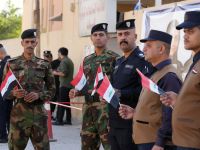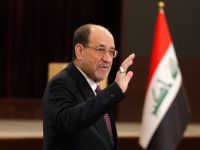By Nabil Al Mulhem
Damascus
Secretary General of the Democratic Front for the Liberation of Palestine, Nayef Hawatmeh, has charged that Palestinian President Yasser Arafat offered substantial concessions on all issues to the Israelis at the trilateral peace summit held in the US presidential retreat of Camp David in July.
In an interview with Albawaba.com at his office in Damascus, where his faction is based, Hawatmeh said that Palestinian negotiators extended “a series of compromises to [Israeli Prime Minister Ehud] Barak and his delegation waiting for them, in return, to agree on a withdrawal from eastern part of Jerusalem. It is proposed that Jerusalem would be the capital of the two states.”
“What happened practically is that the Palestinians made concessions on the border issue, that are contradictory to UN Security Council Resolution 242,” he said.
The DFLP leader, whose representatives to Camp David Talks withdrew as a protest against the compromising stand of Arafat, disclosed that the Palestinian negotiators agreed that Israel annexes major settlements, which constitute five percent of the West Bank, and other settlements making up eight percent of the Jordan Valley. Besides, the Palestinians would lease to Israel a strip of land in the valley with an area of seven percent.
“In other words, Israel would annex or rent 20 percent of Palestinian lands,” Hawatmeh added.
On security issues, “Israel won all what it needed,” according to the leader, who said that Arafat and his delegation accepted that the Palestinian state would not have an army, or allow any Arab armies to enter in its territories. Moreover, “the Israeli airforce would be free to fly over its lands, and install early warning stations in the hills overlooking the Jordan Valley. Israeli troops would also be deployed along the Jordan Valley, which means the Palestinian state would be deprived of a border with Jordan.”
Hawatmeh went on to say that the solutions suggested at Camp David to the refugee problem were not based on the right of return, but on Israel’s policy of containment and settlement.
According to him, negotiators agreed that an international-regional conference would be held to facilitate the containment of 100,000 refugees in the Jewish state over a period of 10 years, and half a million in the Palestinian state. Meanwhile, about 3.5 million Palestinians would remain in their host countries.
Asked if such compromises would lead to a Palestinian independent state, the leader said “such a state would be armless and founded on 80 percent of the West Bank and Gaza Strip.”
According to Hawatmeh, “when it came to the Jerusalem issue, Barak did not make any compromises as to the Israeli occupation and Judaization of the city. He insisted on full sovereignty over the eastern quarters and the peripheries within Greater Jerusalem as the unified capital of Israel.”
In addition to that, said Hawatmeh, Israel planed to expand Greater Jerusalem by adding four settlements and a number of Arab villages outside the city’s present area. When Arafat realized the trap he was in “he cried out rejecting these solutions to the Jerusalem Issue.”
Hawatmeh advised the Palestinians to learn a lesson from the Syrian-Israeli negotiations that took place late last year, where any progress achieved by one of the working committees was linked to that achieved by the other committees. “There,” he said, “international legitimate resolutions were the basis of all solutions to any issue on the negotiations agenda.”
The Palestinian leader criticized the Palestinian negotiators for indulging in backdoor talks with their Israeli counterparts. He said that holding secret talks signals that the PA “turns its back to the Palestinian people and deprives them of a say in what is going on.”
“It also means that only the PA team will take decisions without referring to the PLO factions, PLO Central Council, or the international resolutions.”
He called for the reconstruction of national unity among the Palestinian factions and political powers who should agree on a joint political program based on international resolutions.
To Hawatmeh, the guidelines for such a program are the right to self-determination, a Palestinian independent state within the July 4th, 1967 borders with Jerusalem as its capital, and the return of Palestinian refugees in accordance with UN resolutions.
The DFLP secretary general called also for the convening of the central council with the participation of Hamas and Islamic Jihad “to decide on the steps to be taken and respected by all.” – Albawaba.com
© 2000 Al Bawaba (www.albawaba.com)







